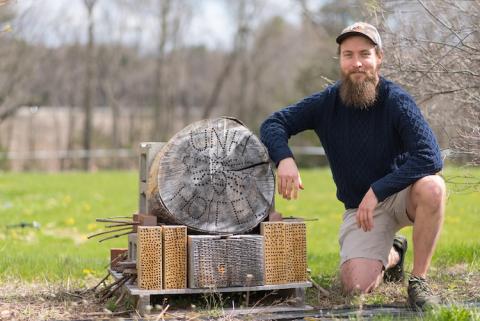
Wyatt Shell recently earned his doctoral degree in integrative and organismal biology, after successfully defending his dissertation, "Behavioral and genetic mechanisms of social evolution: insights from incipiently and facultatively social bees."
Wyatt Shell: During my PhD, I had the great fortune of getting to approach the study of nature from the field of sociobiology, which seeks to better understand the many elements contributing to the phenomenon of animal sociality.
Most of us are at least vaguely familiar with honey bees – they pollinate flowers and of course make honey, but they also have huge colonies with a single queen and thousands of workers. This amazing social structure – which we refer to as eusociality – is one of the honeybees’ most obvious features, but it’s actually a really rare thing to see. Honey bees represent just one of over 20,000 species of bees worldwide, and many of those species either have no social organization or demonstrate less complex forms of sociality (e.g. they may have only a few workers, or less clear definition between queens and workers).
One of the big sociobiological challenges, and the core driver of my research, is identifying the behavioral and molecular mechanisms that may underpin the evolution of such awesome social complexity. There are several major theories of social evolution that make predictions about the kinds of changes we might expect to see in an ancestor of a eusocial species. In particular, I study bees that demonstrate less complex forms of sociality, treating them as potential ancestors of more complex social descendants to empirically test these theories.
Wyatt: I believe this research is important for two key reasons. The first and most immediate is that it helps us to better understand the rich array of mechanisms – genetic, environmental, behavioral, and more – that might precipitate social complexity across our many natural systems – including our own. Sociality is one of the most complex traits we’ve seen in nature, and wrestling with its origins and dynamics is arguably a highly personal puzzle for anyone.
The second reason this work is important is that it greatly improves our understanding of one of the most ecologically important groups on our planet – bees! Bees really need our help right now; and, while we’re all in agreement to save honey bees, the more we learn about the biological narratives of the other 20,000 bees on our planet, the better equipped we’ll be to know how to help them, too.
Wyatt: One thing that has become clear through my research, and that has been showing up in other studies among social insects, is just how strong an effect the social environment itself may have on an individual’s gene expression.
Bees that demonstrate even relatively simple sociality go through a period of life in which they live in close contact with other individuals inside their nest. Although my work was not the first to suggest that this effect exists, seeing just how strong an effect it may have in the data – even in species that live socially for only a brief part of the year – was very surprising and exciting.
Wyatt: As of this writing, it’s off to a postdoctoral research position for me – I’m loving this work and am excited to pursue it further. From there, who knows? I'd love to continue learning about our many bees while also engaging in projects that will have immediate and lasting positive impacts on pollinator health and the integrity of our global ecosystems. It's important and increasingly necessary work, and I'd love to do it!
Shell WA, Rehan SM (2019). Social modularity: conserved genes and regulatory elements underlie caste-antecedent behavioural states in an incipiently social bee. Proceedings of the Royal Society B. 286:20191815
Shell WA, Rehan SM (2019). Invasive range expansion of the small carpenter bee, Ceratina dentipes (Hymenoptera: Apidae) into Hawaii with implications for native endangered species displacement. Biological Invasions.
Lawson SP, Shell WA, Lombard SS, Rehan SM (2018) Effects of climatic variation across a latitudinal gradient on social plasticity in small carpenter bees. Insectes Sociaux. 65:483-492
Oppenheimer RL, Shell WA, Rehan SM (2018) Molecular ecology and phylogeography across three populations of the Australian small carpenter bee, Ceratina australensis. Biological Journal of the Linnean Society. 124:747-755
Dew RM, Shell WA, Rehan SM (2018) Changes in maternal investment with climate moderate social behaviour in a facultatively social bee. Behavioral Ecology and Sociobiology. 72:69, 1-12
Shell WA, Rehan SM (2018) The price of insurance: costs and benefits of worker production in a facultatively social bee. Behavioral Ecology. 29, 204-211
Shell WA, Rehan SM (2018) Behavioral and genetic mechanisms of social evolution: insights from incipiently and facultatively social bees. Apidologie. 49, 13-30
Shell WA, Rehan SM (2017) Range expansion of the small carpenter bee, Ceratina smaragdula, across the Hawaiian archipelago with potential ecological implications. Pacific Science. 71(1), 1-15 (COVER ARTICLE)
Shell WA, Rehan SM (2016) Development of multiple polymorphic microsatellite markers for the small carpenter bee, Ceratina calcarata, using genome-wide analysis. Journal of Insect Science. 16(1), 1-4
Shell WA, Rehan SM (2016) Recent and rapid diversification of the small carpenter bees in eastern North America. Biological Journal of the Linnean Society. 117, 633-645
Learn more